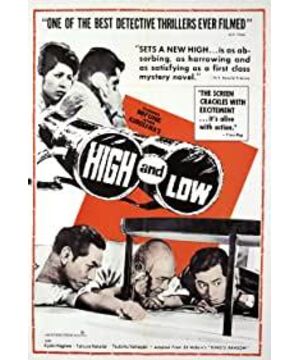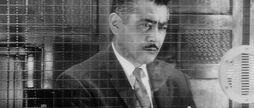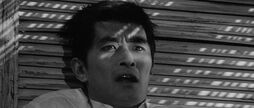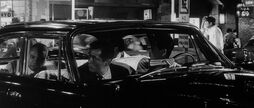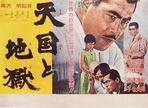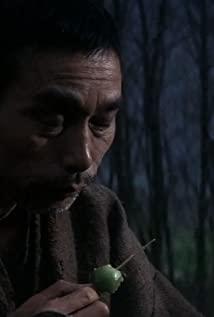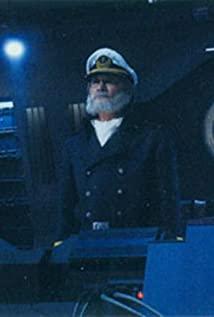The story quietly happened in this seaside city with mountains visible. Along with the switching of the camera, the towering floors and the low bungalows are staggered. Between the sky and the earth, there is only a gray area. Heat, anxiety, restlessness, everything is scorching people's hearts. People living in heaven are looking down at pedestrians on the ground from their windows, and people on the ground are also watching the movement of heaven.
The film can be divided into two parts, taking the beginning and end of a kidnapping case as the axis, telling the difficult decision of the entrepreneur Kwonto Imago when paying the ransom to the son of the driver and the hundred scenes of the world when the Minister of Police Kurato solved the case. The first half is the struggle of the "heaven" in humanity and conscience, and the second half is the degeneration and pursuit of the "hell". At the same time, it also intersperses and shows the two worlds of heaven and hell: the former is a villa on the top of a mountain, the European-style lawn is repaired and tidy, the huge French windows isolate the noise and dirt from the outside world, and the women in the exquisite home are dressed in Traditional kimono; while the latter is a row of houses on the mountain, a pond filled with white foam and rubbish, a muddy puddle is splashed when cars pass by, and people are either naked or wandering in colorful clothes. The people living in the heavenly kingdom are intrigues, and there is a sharp conflict in the limited space. The stage-based arrangement method, you sing and I will appear on the stage, the rapid concentration of the focus figures, and the rapid fading out of the non-focus figures, all in an instant. It's a good show.
Compared to heaven, what I love more is the scene of hell. Hell is turbulent undercurrents. Because compared to the misfortune of those who live in heaven, those who live in hell are always ignored. In such two almost parallel worlds, if it weren't for the connection of Takeuchi, there would not have been any intersection. In his eyes, the picture of hell can be seen almost everywhere. Yokohama, this modern metropolis, was baptized and rebuilt by war. After the end of the US-Japan security struggle, a large number of US troops stationed in Japan flooded here. The wave of post-modernism has struck, traditions have yielded, secularism has become worse, and crimes have multiplied. In this environment, people are heterogeneous and morally degenerate.
He is a strange man, clever and cunning. When he arrived, Schubert’s trout sounded in the crowded street; when he was letting go, there was a white robe with red carnations among the colorful crowds; even when he slipped into the trap of crime, his head was also Poked out of the flowers. Such a person is either an angel or a devil, and he is indeed enough asshole. He is a mysterious symbol. The film hardly explains his origin, family, background, experience or even his motives for committing crimes. Just like the first half of the protagonist Quan Teng's life-this matter does not involve "heaven", there is no way to know. When I watched this movie for the first time, I couldn't help asking repeatedly: Is it that way? The people in the kingdom of heaven returned to peace, the people in hell still wandered out of focus, stepping under the cold dust. There are always poor and rich people in the world, and inequality in society is a matter of course. Kurosawa believes that all he can choose is hard morality. Perhaps only at the moment when the two of them looked at each other on the barbed wire, did the kingdom of heaven briefly succumb to the people in hell, watching the distortion, metamorphosis, alienation, screaming and trembling of the people in hell, and humanity being trampled underfoot and turned into powder. But rather don’t know whether the kingdom of heaven envelops the hell or the hell surrounds the kingdom of heaven? Just like the wisp of pink smoke when burning in the high tower, it seems to be a signal from hell to heaven, because only at that moment can people in heaven be able to look at hell. At this moment, the world is like a huge 笱笱. No matter how wailing and wailing the people in it are, they cannot escape. People in heaven and hell each have their own misfortunes, and purgatory is in their hearts.
View more about High and Low reviews


